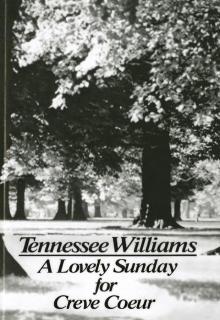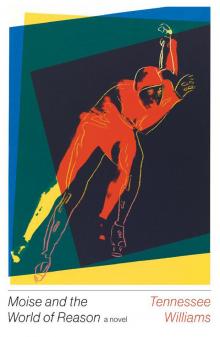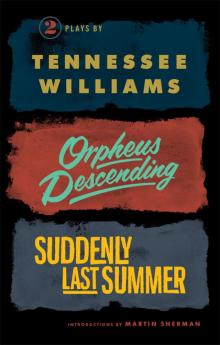- Home
- Tennessee Williams
Moise and the World of Reason Page 4
Moise and the World of Reason Read online
Page 4
Then I saw that my alarm was unjustified as it was only a piece of Kleenex that he had removed from his pocket and he wiped his watery eyes with it.
“I began with poetry and I think I might go back to it. It’s cheaper to produce and I think that the current standards are even lower. Of course all forms of self-expression serve the same purpose.”
I didn’t ask what purpose but he continued as though I had.
“To get you out of yourself.”
Then his look turned inward again: I felt released, not from my self but his. I suppose he was sorting through his sixty-odd years of recollection like a pack of old Tarot cards and, looking at him without much interest during his period of introversion, I wondered about his ethnic origin. If he were a Jew, he must have been a Sephardic one, the kind that never wandered but stayed in Spain. Or have I got that backward? But he did seem more like a creature whose parts derived from foreign places and were only assembled in the States. Perhaps he was a kind of Gypsy, and as if he divined my speculations about him, he leaned back dreamily in his chair and said, “Since I left home in my teens I’ve always lived a nomadic sort of existence as if I were looking for something of vital importance to me which I had lost somewhere.”
“Are you giving an interview to me?” I asked him with a touch of asperity.
“Don’t be bitchy, love. You’re Southern like me and we have to be gents.”
“Not when deserted by the second love of your life, a youth who was designed by Praxiteles.”
“An artist of the world’s first and last democracy. Was he blond as I’ve heard the early Greeks were and was his skin?”
“What?”
“Flawless ivory wedding-gown satin smooth?”
“You left out warm.”
“Oh, that comes with it, the body provides the warmth.”
“Especially with a fever.”
“All worthwhile brides, or loves, run a little temperature, baby.”
“For a little while. They cool off.”
“Even the sun cools off.”
“Gradually, not suddenly.”
He nodded slightly and his look turned inward again.
“The effort of making a comeback is an inadvisable effort because it exhilarates you at first like a speed shot and then you crash. Sometimes what seems like a trivial thing will do it, like a letter being omitted from your first name on the Times drama page. What was, where was? Oh, yes, I love to travel. I had a fellow traveler of my own gender and inclinations till four packs a day and Memorial took him, all but his pride was removed. Stayed till he went away.”
“I think I ought to go now.”
“Yes, he went. Dignified and lonely as a comet through space.”
He smiled as if he’d accomplished the dignified flight with him.
“Shouldn’t you call that cab now?”
“Oh, and this evening, or some evening this week, I read about an astral phenomenon called a quasar and learned that it is the nucleus of a new galaxy in the sky in a state of formation through expansion and that it’s, I’m no good at fixtures, sorry, I mean figures, but I believe they said it was two million or billion light years away and was the most distinct and so was presumably the closest to you and me sitting here. Sorry. My brain was damaged by three convulsions in one morning at Renard Division of Barnes so there is rarely much comeback to clarity now.”
My attention had begun to turn upon him with more interest now, since he’d also suffered confinement, and I noticed that a fleeting illusion of youth had appeared on his face, the lines still quite apparent but a ghost of a much younger face appearing through its descendant.
“We were flying from L.A. to San Francisco on a two-prop plane back somewhere in time and we were over mountains when the stewardess passed down the aisle, she was trying to reassure us about a mechanical failure of the plane. She said loudly in a quavering voice. ‘We are turning back to Los Angeles because one prop has failed. Don’t be alarmed if we start losing altitude.’ Well, I was petrified with alarm despite her injunction against it since I could see out the plane window that we really were dropping toward the mountains and I said to my beautiful young companion,‘I guess this is it.’
“‘Forget it. I’ve flown over the Pacific, a parachuter in the war, in planes riddled with flak, with one or two motors gone, and I just ignored it.’
“He had a book in his hand, however, and I noticed that while he was pretending to read it, he was flipping the pages over as fast as if he was looking up a name in an address book.
“I had another idea of how to insulate myself against threatening disaster, since in those days I always went out with a pink barbiturate capsule in my coat pocket. Well, everybody was sitting very stiff and still in the plane as it lost altitude but I got up and went to the lavatory and dropped the pill, and when I returned to the seat beside my friend, I was calmer than he was. He was still flipping the pages of the book faster than a human computer could read but I was so tranquilized that I put a hand on his thigh to reassure him as well as to enjoy its familiarly dear contour.
“‘For Chrissake,’ he said, ‘Don’t make a brutta figura in front of the stewardess and the passengers on the plane.’
“‘Who’s looking at anything but his own terror?’
“‘Look, if we don’t take another plane to San Francisco tomorrow you won’t have the guts to ever take another flight again.’
“And about noon the next day we did take another plane to Frisco. But it was a four-prop plane. You see, in those days I had someone to control my panic and arrange my life for me, but now I have got to manage it alone except for short-term companions.”
He’d ordered another bottle of the dago red since I had finished the second half of the first during his anecdote.
He was well into this second bottle and into his next anecdote.
“I’ve been solaced till lately by the traveling companionship of a lady I knew who was as restless as I am.”
(I wondered why he said knew instead of know, and was, not is, but that was to be revealed.)
“One spring we flew from Athens to Rhodes, I mean the Greek island, baby, and a big contingent of the U.S. navy was in the harbor there, too. We were sitting outside a waterfront bar admiring the electric display which the navy boys had rigged up before they came ashore. There was a particular sailor on shore that outshone the electric display and appeared to be in hilariously good and responsive humor, so I turned to this great lady at the table with me and began to complain about our hotel accommodations on the Island of Rhodes. This was a new hotel, set far back from the harbor, and it was a baffling maze of steep ramps and stairways which I found it difficult to steer my lady friend up when we went home after midnight. I said to her, ‘Honey, you know we can’t stay another night there and you know the only good hotel on this island is the Hotel des Roses straight to the left a little ways down the street. Now why don’t you go over there and turn on your Southern charm and book us in there tonight for a two-week stay?’
“This lady-companion, being a really great Southern lady, would never refuse a heartfelt request like that, so off she wobbled down the waterfront to the left toward the Hotel des Roses, and I was then free to concentrate on the hilarious sailor but it soon turned out that he was more responsive to a navy buddy than he was to me, so I had to sit there downing one ouzo after another for an hour before my lady-companion came wobbling back out of the dimness of the beyond and as she came into the light I noticed that the front of her pink skirt was almost entirely covered with a dark stain and as she came still closer to the waterfront table, I detected an odor of piss.
“I said, ‘Honey, it looks like you spilt something liquid on your skirt,’ and she lurched into a chair with a raffish grin and said, ‘Yes, well, on the road I was forced to urinate and there wasn’t a ladies’ room visible along there, so I just squatted down in the road and let it go.’”
At this point he leaned back in his chair, laughing
, and fell on the floor, but seemed not to notice this incident, just picked the chair up and sat down in it again and continued his story.
“So I said to her, ‘Oh,’ and then I asked her if she had booked us into the Hotel des Roses.
“‘No, honey, negative there. The desk clerk tells me it’s booked up solid as a rock for the next six months or more.’
“Well, I should’ve dropped the subject but it was so intriguing, I asked her,
“‘Did you, uh, pee on the road before or after you got to the hotel?’
“‘Why, naturally, before. You know I’ve got a weak bladder and I certainly didn’t want to commit a public nuisance in the hotel lobby.’
“‘Oh, so, before. Well maybe, honey, that had something to do with their being booked solid for so long in advance.’
“That sounds like a bitchy remark for me to make to this great Southern lady, but it didn’t phase her, nothing much phases a lady. She looked at me and grinned. It was a crooked pirate’s grin, an oh-fuck-it-all sort of grin which had great charm and distinction, I swear it did. She was what the French call a jolie laide, which means—”
“I know French. It means pretty despite.”
“That’s right, despite everything. God, how I loved that girl.”
By now we’d finished the wine and had caught a cab.
My chance companion had sunk into a mood of revery and sorrowful regret.
It didn’t particularly concern me but I asked him, out of politeness, if he was still traveling about with this jolie laide.
“Grinned like a pirate but was an absolute lady.”
“I asked if you still travel with her.”
“No, not now, how could I? Smoked continually, fifth of bourbon, quart of Scotch a day, with double martinis at meals, no, I’m not traveling with her, God rest her soul full of love.”
“She’s, uh, taking a cure?”
“She’s taking a rest in her heavenly mansion.”
“Oh. Departed.”
“Tha’s right, too far to follow. Complications of cirrhosis and emphysema removed her from this world and left me stranded.”
He changed his glasses and peered at me in the cab.
“You like travel?”
“If you mean would I like to replace her as your traveling companion, no, I wouldn’t, no further than West Eleventh.”
He’d told me such a sad story that I began to shed tears as if I were listening to Lady Day again.
“Didn’t mean to distress you.”
As if to console me for a loss as great as his own, he began to stroke me here and there and God knows where it would have been next if the cab hadn’t lurched to a contemptuous halt in front of the dockside loft.
I said, “Thanks for the ride,” and sprang out.
“Oh, do we get out here?”
“I do but not you.”
“Why?”
“Because I live here.”
“In a place this big and dark? Nobody could live here!”
“No, but I do.”
He gasped and said, “God almighty! I didn’t know you were dead!”
“Forget it or fuck it.”
“Baby, I meant I thought that only I was. The single tenant of the great ebony tower! I didn’t know that we occupy the same world. Hey, wait!”
I don’t know if he meant me or the cab, but the cab lurched quickly away, and I am not at all sure that reporting this encounter in such detail is justified by the few little touches of parapsychology in it, faint as the bits of blue in Moise’s final (?) painting.
II
WHICH BRINGS ME HOME and alone to my little Blue Jay in the West. I should probably explain that a Blue Jay is a grade-school notebook which is approaching extinction like certain species of real birds. I was so attached to it, the Blue Jay notebook, to the pale blue regularity of its parallel lines on each side of the page, that I had them mailed to me, in lots of a dozen, by their manufacturers in a Southern city that’s near my birthplace, Thelma, Alabama. Well, actually, I have them mailed to Moise, since this abandoned warehouse has no mailing address. I can’t rid myself of the feeling, even now when I’m thirty, that I am still a fugitive from the truant officer of Thelma. And from my hardshell Baptist mother who hasn’t written me, care of Moise, in a couple of years and so may have gone from earthly concerns by this time, including her excessive concern for her only child, which is me. Or have they put her away now, and which would be better? When a person is put away, if it’s a woman, she will occupy a rocker in what is called a dayroom. When she is agitated, she will rock fast. When she is sinking into the lethargy of despair, she will rock slower and slower, till finally the rocker stops altogether, and then they are likely to put her on another floor where people exist like vegetables, withering into a equinox which is opposite to vernal.
(Of course I prefer to think that she has departed without stopping the rocker.)
These pencil-scribblings in the Blue Jay, and soon to be on other surfaces available for scribblings, would be illegible to anyone less familiar with my own kind of speedwriting than I am familiar with it to the point of hysteria.
The word “hysteria” derives from the word for womb in one of the ancient tongues, Greek or Latin. I know this because a woman has a complete or partial hysterectomy when all or some of her female organs are surgically removed because of disease or sadistic caprice upon the part of a surgeon.
Deciding to conserve the remainder of the Blue Jay, I start to write upon rejection slips, a great horde of them in and out of their envelopes stashed beneath BON AMI, which is a deterrent to the progress of this thing as I can’t help reading the hasty little comments of the editors. The lady editors are consistently gentler than the gentlemen ones who are consistently waspish. One says simply, “Hysterical, see a doctor.” Another says, “An inflamed libido, suggest ice packs on head and crotch till corrected.”
Yes, I agree, but
I am at home and alone during those wolf’s hours that extend in an upward sweep of hysteria from midnight till winter daylight, unrecognizable here since never admitted to the hooked rectangle.
The libido is in the unconscious which is in the thalamus which is in the rear section of the brain which takes me all the way back to my geography classes in Thelma, Alabama, and to the sad but companionable recollection of Miss Florida Dames who taught geography there and who was a spinster withering desperately toward her time of retirement or unmentionable death, which I have just now mentioned as one is compelled in a dream to open a closet door despite or even because of one’s intense dread of what it is closed upon.
And back, now, to seventh or eighth grade geography in the class of Miss Florida Dames in Thelma High Junior and Senior. And it is drawing toward spring, the air is infected with a sensual languor, the sort of atmosphere that exists and prevails in my Blue Jays.
(Came very near saying “blue jeans.”)
And fatally one day Miss Dames does not enter the classroom alone but accompanied by her little non-singing canary in its delicately shimmering wire cage and it is as if she had brought along with her an image of her implacable retirement soon to contain her but not shimmering and not delicate as wire with swinging perches for a loved companion. Some girls giggle, some boys grin, and she gives them a little bow of her tight-curled head as if to acknowledge a modest round of applause and she then nods encouragingly to the canary and she places the cage on her desk, remarking, “It was so frightened today I couldn’t leave it at home,” and even the most insensitive clod in the class must have sensed, at least dimly, that she was referring to her own fright more than to the canary’s. Then she sits down and says, “If it disturbs anyone, please raise your hand and I’ll”
She didn’t say what: I don’t think she meant she’d remove it. I think that Miss Florida Dames was terrified of being without her canary, yellow as butter in a wire cage yellow as finely spun gold.
However, its presence didn’t calm her nerves any more effecti
vely than her nerves calmed the canary. She became more and more agitated as if there were a storm of wings in her narrow chest and her necklace of coral shook and her voice shook with it and the canary hopped about with more and more agitation, in precise correspondence to hers.
“Roger, will you please”
(She stopped, gasping for breath.)
“Pull down the”
(Gasp for breath.)
“Map of the world I received from the P.&O. Lines in Mobile?”
He was a tall boy in the front row and when he rose after long hesitation to comply with her request, the fly of his corduroy pants bulged as if he’d been entertaining libidinous thoughts concerning Miss Dames or her canary or the very large colorful map of the world. She had often informed us it was presented to her by a branch office of the P.&O. Lines twenty-five years ago when she had considered a holiday trip to Hawaii. She had been obliged to abandon that idea for an unexplained reason probably having to do with the expense of it, but she did have the map, courtesy of P.&O. Lines Ltd. . . .
(Limited to what? Her travel expenses that summer? Certainly not to the geographical details of the map.)
Again girls’ giggles, boys’ grins, and Roger flushing and shuffling up a narrow corridor of space between embarrassment and pride at the bulge of his sub-equatorial pointer that spring afternoon, and jerking the rolled map down with the violence of a rapist and Miss Dames gasped and her coral necklace bounced on her narrow chest. Girls giggled, boys grinned, the canary hopped wildly about and Miss Dames recovered sufficiently to request,
“Now point out to us the islands called the Marquesas.”
(And it occured to me, “Will he open his fly to point them out with his —?”)
He stood there, voiceless as the canary and beginning to grin.
“Roger, the Marquesas, where?”
The heretofore voiceless canary utters a loud “Cheep” and the classroom explodes with laughter and a moment or two later the door explodes on the principal and he rushes straight up to the desk and grabs the cage handle with one hand and Miss Florida Dames’ skinny elbow with the other and shouts “Class dismissed” as he exits with them both from the classroom into the corridor and the uproar of the geography students is abruptly hushed when, at some distance down the corridor, Miss Dames begins to cry out again and again as if mortally assaulted.

 Vieux Carre
Vieux Carre The Night of the Iguana
The Night of the Iguana A Lovely Sunday for Creve Coeur
A Lovely Sunday for Creve Coeur Sweet Bird of Youth
Sweet Bird of Youth Streetcar Named Desire
Streetcar Named Desire The Milk Train Doesn't Stop Here Anymore
The Milk Train Doesn't Stop Here Anymore Crazy Night
Crazy Night Three Plays of Tennessee Williams
Three Plays of Tennessee Williams A House Not Meant to Stand
A House Not Meant to Stand 27 Wagons Full of Cotton and Other Plays
27 Wagons Full of Cotton and Other Plays Tales of Desire
Tales of Desire Moise and the World of Reason
Moise and the World of Reason The Traveling Companion & Other Plays
The Traveling Companion & Other Plays Baby Doll Tiger Tail: A Screenplay and Play by Tennessee Williams
Baby Doll Tiger Tail: A Screenplay and Play by Tennessee Williams Memoirs
Memoirs Baby Doll & Tiger Tail
Baby Doll & Tiger Tail Crazy Night (A Mulholland / Strand Magazine Short)
Crazy Night (A Mulholland / Strand Magazine Short) Orpheus Descending and Suddenly Last Summer
Orpheus Descending and Suddenly Last Summer Three Plays
Three Plays The Glass Menagerie
The Glass Menagerie A Streetcar Named Desire
A Streetcar Named Desire